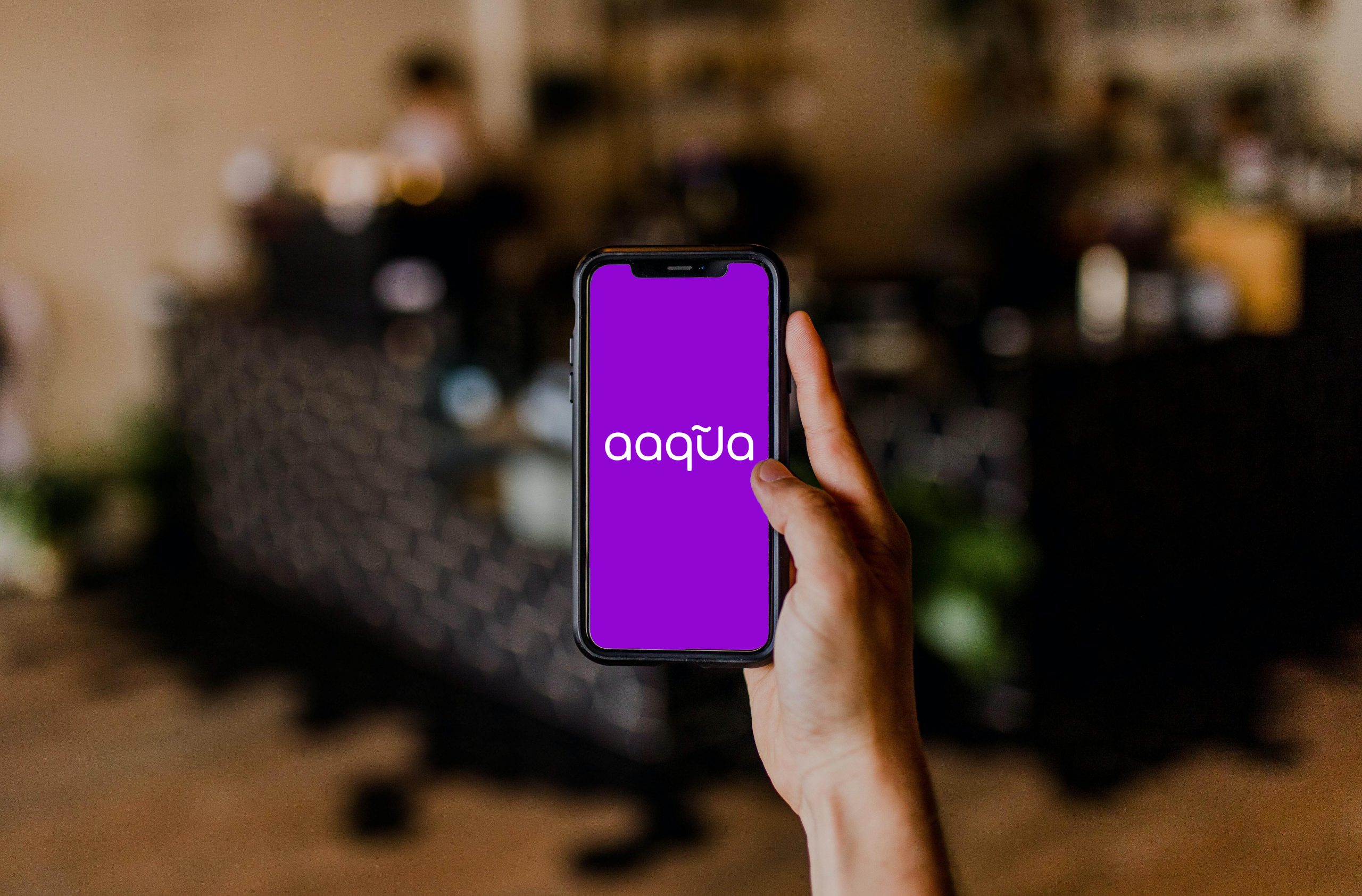Top image: Austin Distel/AAQUA/Yulianna Frederika
All names have been changed.
“The culture at AAQUA was so welcoming and encouraged innovation, all fully supported by the CEO, Robert (Bonnier). This all sounds like your dream job, right? Yeah. I thought so too,” sighs Olivia, who is in her 30s and one of the 175 recently retrenched employees of AAQUA.
AAQUA is the startup behind the namesake app poised to reshape social media platforms, “power your passions”, and ultimately be a force of good. That is if it actually launched and if we have any idea how the app functioned, that is.
In the cut-throat and scrappy world of startups, failures are common, with 90 percent of startups failing. Successes, if any, are few and far between.
But what makes AAQUA stand out in the graveyard of unsuccessful startups is, perhaps, that no one thought this promising well-funded startup would ever fail. AAQUA attracted and recruited talent from top tech companies for an app that never launched.
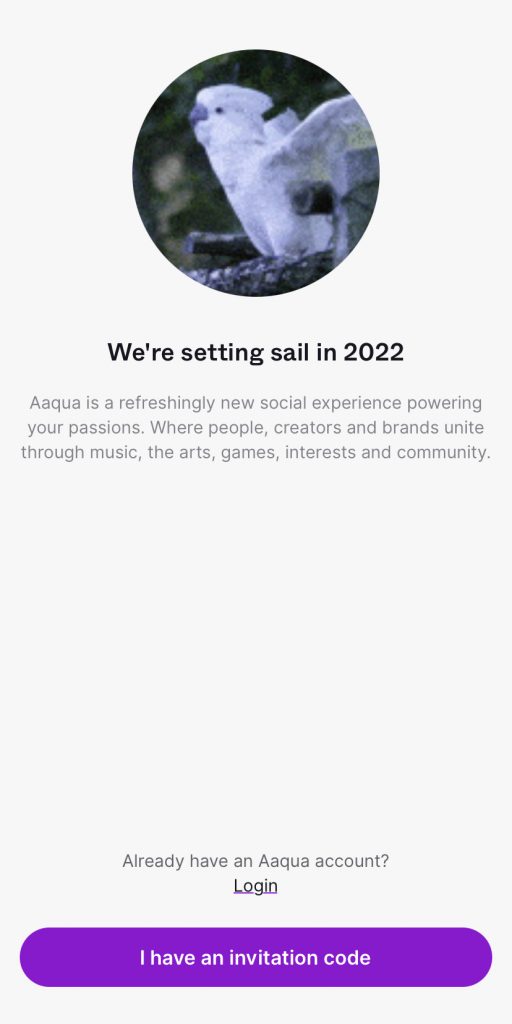
About four years later, they would face bankruptcy and owe months of salaries to their employees.
It was once on the precipice of disrupting the social media landscape with the noble mission to “do good”. This tenet hasn’t been practised for its own employees.
Still, empires don’t crumble in a span of a day. With AAQUA, the fissures and cracks were there long before everything went up in flames.
Humpty Dumpty had to sit on the wall for a bit—until the end of August 2022 in this instance—before it all came tumbling down.
Promise and Promises
From the start, AAQUA presented a glittering vision to change the world—par for the course for any startup promising to create something better. Like any other startup, they would proclaim their service/app/solution to be the next best thing to sliced bread, offering ingenious solutions to age-old inconveniences.
With AAQUA, it was all that. And it came with an equally handsome chunk of change.
“I was drawn to AAQUA because they had this really good idea of creating this utopian social media platform where it’s all about passion communities,” explains Olivia, an engineer who has worked at AAQUA since 2021.
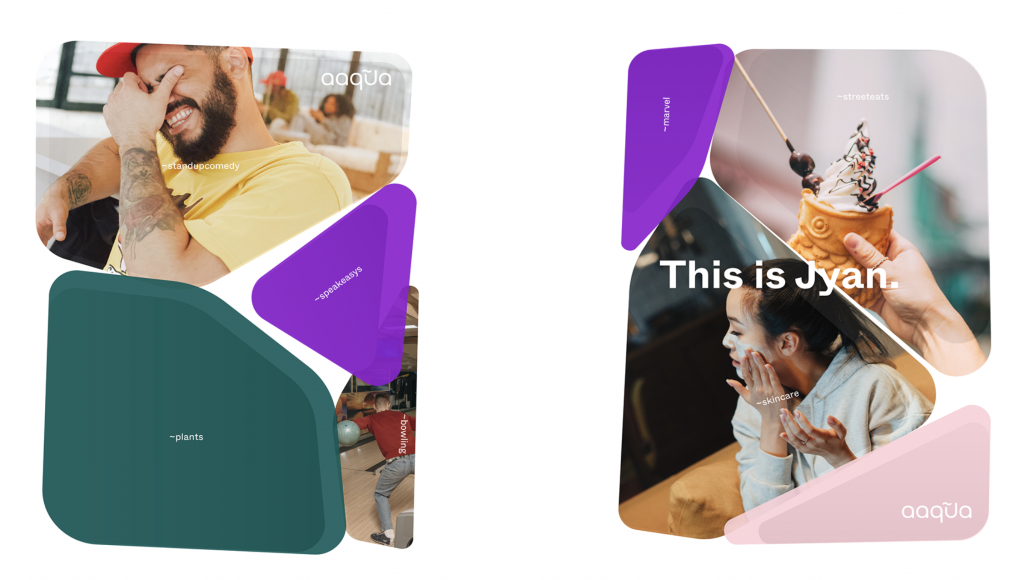
“They were not going to be as spammy as other platforms and would be a circular economy where things are self-generating,” explains Olivia. She recalls attending early interviews and meetings, where AAQUA was presented to her as not the next TikTok but something entirely new altogether.
“AAQUA was founded on the view that today’s social media incumbents inherently had a conflict of interest because all the data collected from its users would be monetised for profit,” continues Jack. He has been in AAQUA since 2021. Jack’s position at AAQUA is kept anonymous to protect his identity.
AAQUA would not face this conflict of interest, they proclaim. The platform wouldn’t show advertisements, Jack tells me over email, and “the user’s data could only be used to recommend more content which suited one’s preferences.”
“But then, of course, this left the question wide-open: if AAQUA doesn’t serve ads, how does it generate revenue or profits?”
Besides the opportunity to create something revolutionary, AAQUA drew people in with their generous salary packages.
Right off the bat, the company’s compensation was among the highest in the market, along with a slew of perks that, in hindsight, sounded too good to be true. Managerial roles, such as department leads, were drawing starting salaries of S$8K to S$9K a month, while more junior positions, such as community managers, were raking in S$4.5K to S$5.5K a month.
Employees also enjoyed excellent health insurance, an extensive leave package of 23 days, and an additional six days of parent-child leave, which, some of the interviewees for this story shared, wasn’t restricted to their own children. This brought the grand total to 29 days of leave.
Another golden carrot dangled for all AAQUA employees was the General Availability (GA) bonus.
“So the GA Bonus was something significant,” Olivia divulges. “It means if the app is launched to the App Store without beta testing and becomes generally available to the public, there will be up to a 50 per cent bonus on top of your yearly package.”
“Assuming you’re earning 100k for the year, that’s up to an additional 50k,” says Olivia.
Other employees RICE spoke to mentioned that initially, it was a more lucrative 75 percent GA bonus. It later got reduced to 50 percent as the app launch was continually delayed—the first red flag, perhaps.
Even so, the assurance and expectation that employees would eventually get their GA bonus were enough to keep most people at AAQUA soldiering on. This despite the launch date being pushed back multiple times.
Initially, the app was slated to arrive in March 2021, but then this date was pushed back to October 2021, which rolled to December 2021 and then January 2022.
Still, the app was not ready. This date eventually became April 2022, which then became October or November 2022.
Ace Working Culture, High-Calibre Colleagues
Despite working towards an app that never seemed to manifest, most employees of AAQUA rationalised it as the nature of tech startups, where things are messy and change all the time.
Besides the money, AAQUA also had a highly coveted culture, especially for those working on the more technical side of things like Olivia.
“The intangible attraction, I would say, is the culture. So a lot of people came from FAANG (the acronym for Facebook, Apple, Amazon, Netflix, and Google). Obviously, this was a high calibre team and an environment you want to be immersed in and learn from,” says Olivia wistfully.
“It was one of those companies where although it was quite big, everyone sort of knew each other,” adds Aaron, in his mid-twenties, who has been in the company for close to a year. “There were lots of times we would always gather in groups. It was a pretty good culture.”
There was also a magnetism about AAQUA as a place that highly encouraged innovation. According to Olivia, Mondays were days when regular work took a pause, and Olivia’s team had the opportunity to experiment and get the creative juices flowing.
“You could experiment on anything you’d like, and later, you’d present it to the team. There were no hard and fast rules for Mondays.”
From the outside, AAQUA was that girl of a company with swanky office spaces at Regus (think WeWork but posher), an enviable workplace culture, and a hefty salary package to boot. What could possibly go wrong?
The First Crack in the Glass
One of the charms of a startup like AAQUA is the seemingly endless space to create anything and everything from the ground up. It’s catnip for anyone with a strong creative spirit. Even so, this playground-like energy can only be fun for so long before it becomes tedious.
But with an app that hadn’t materialised over the course of two years, understandably, employees at AAQUA were getting worried.
After all, two years and nothing to show does not an illustrious CV make.
Part of the reason for this delay was interface-related. There were two significant pivots to AAQUA’s design during November and December of 2021, which meant long periods of ideating and scrapping previous ideas. It was a constant back and forth of new and old features before they were dropped altogether.
“It’s the idea that if you are set out to do task A, the company wants it completed ASAP. So, that’s what you do, right? Then, they change their minds, and suddenly it’s not needed anymore. You can’t help but feel disappointed. It’s like, what do I do now?” relates an exasperated Olivia.
For Aaron, as much as he wanted to pull his weight, many of his duties could only be carried out once the app was launched. For anonymity reasons, Aaron’s role in the company cannot be revealed.
“My position was a bit awkward. It’s actually the same for many others in the company,” says Aaron. “Since the app has not launched since I joined (in 2021), my job was a bit redundant for the better three-quarters of the time. I was doing work that was not related to my job or filling in for duties that were beyond my position.”
Like Aaron, many employees were aware of this uneasy truth. But the money was too good to pass up.
Aaron recalls: “I think it came to a point where people realised that although the pay was high, there was no progress. The job started to feel a bit shaky and unstable.”
We reached out to AAQUA for their response on the nature of the “redundant” roles of some of their employees. In an email sent to RICE, AAQUA states that since their founding principles are Safety and Integrity, they needed to build a comprehensive team and put in place thorough processes that included role-play for every potential scenario.
AAQUA states: “Team members were actively participating in the creation of original content for a whole host of early Passion Communities, and the number of AAQUA members was growing week over week.”
They claim team members were aware of the forthcoming updates to the app slated to arrive in August 2022, when more members will join the app.

Still, things at AAQUA weren’t at a complete standstill. Things were moving along—just at a painfully glacial pace.
“We have tested the app with friends and family members over and over,” recounts Aaron. “We ran one ‘friends and family’ trial for the app last year and once more this year too.”
The feedback gathered is telling.
“Many people commented that this app is washed out and dated, and we agree with them. We have raised those things internally, but Robert (Bonnier, the CEO) just doesn’t see it as an issue,” says Aaron.
The general sentiment in the company was to just launch the app quickly, test it in the market, and take it from there. Of course, that never happened. And other more glaring issues couldn’t be ignored any longer.
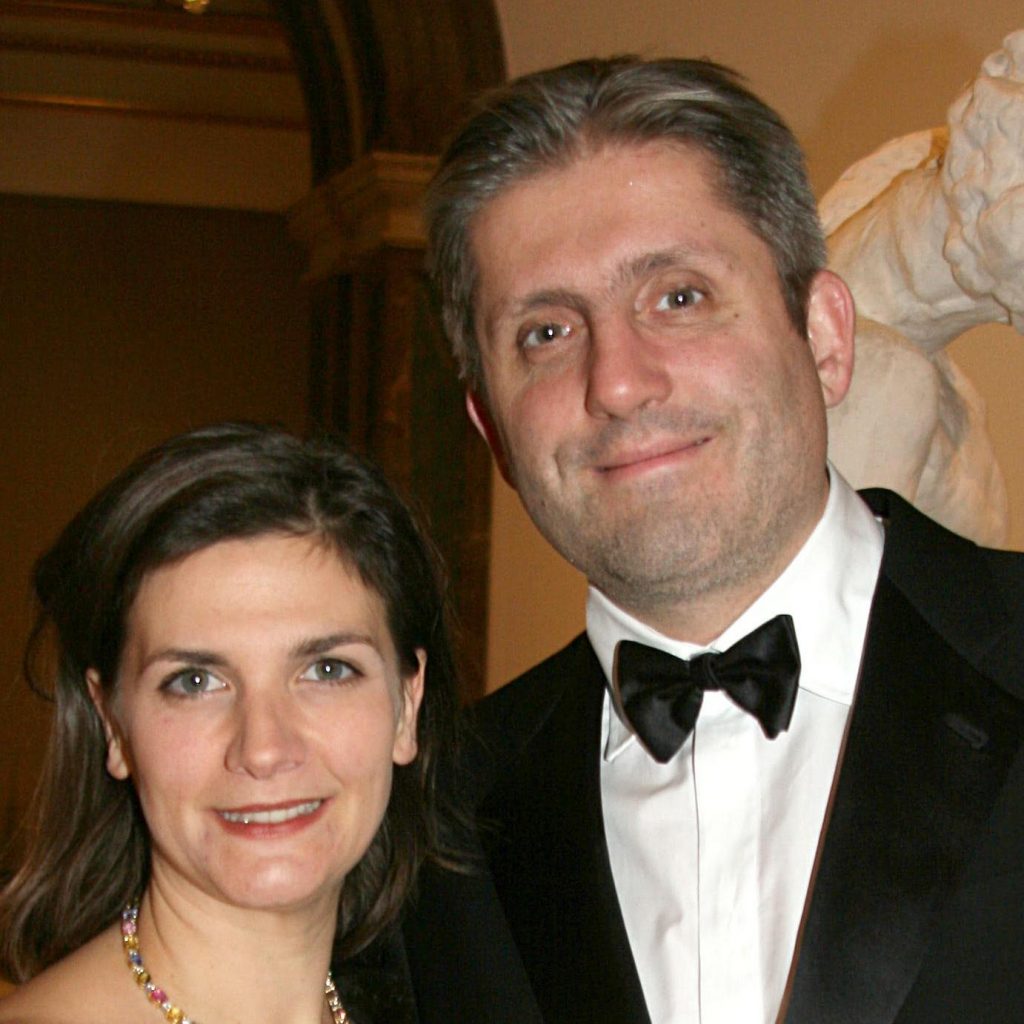
The Mysterious and Mercurial CEO
A storm was brewing in AAQUA and right in the eye of the storm was its CEO, Robert Bonnier. Bonnier has little presence online—peculiar for a CEO working in tech—save for a few old articles about him being sued and fined in the past.
“The thing about this company is that they are very secretive about many things,” says Aaron. “Our CEO likes to leave things to the last minute or like the last resort, and he’s not very open to speaking about the company’s state of affairs,” continues Aaron.
AAQUA disputes this. In an email response from RICE for comments, they claim that Bonnier was in daily contact with all of his senior staff members, and responses were immediate or carried out in very short order. AAQUA maintains that every team member had the knowledge they could contact Bonnier directly 24/7 with their queries or at the monthly AAQUA Live Events with Q&A sessions at the end.
And yet, there were transparency issues. The first major sign of trouble was when AAQUA employees were evicted by their landlord from their luxe Regus offices in Asia Square—supposedly over a rental payment dispute.
“There was a rental payment dispute between AAQUA and the landlord, who claimed AAQUA was in arrears. So, one day, the landlord deactivated all our office passes, and HR was at the lobby telling everyone to work from home and that further announcements regarding our office premises would be made in due time,” says Jack.
Though it was sudden and unexpected, most employees thought it was a pandemic precaution and didn’t think much of it But as Jack shares, no one was apparently in the loop about the office dispute until Bonnier finally disclosed some information about it.
Office Rental Issues and Late Payments
AAQUA claimed that “AAQUA Singapore had paid all its rent throughout the pandemic when that was not actually a Singapore government requirement.” Allegedly, AAQUA and Regus had an in-principle revised agreement, where AAQUA would pay the sum of about S$250k to Regus, which AAQUA says they have done.
Even then, within 24 hours, Regus locked AAQUA out of its offices. AAQUA calls this “hugely embarrassing” and that Regus “demonstrated bad faith and worse.”
AAQUA states that their relationship with Regus deteriorated further, and Regus decided to invoice AAQUA for the full amount of the residual contract—a move which AAQUA calls “wholly unacceptable”. AAQUA has made a counterclaim regarding these payments and is leaving the matter in the hands of Singapore courts.
Then came the late salary payments.
“For months until today, we were paid later and later. One particular month, we were told salaries were paid almost a week late due to some bank holidays in Belgium,” says Jack.
“Most of us didn’t believe that excuse because it seemed improbable that something as crucial as payroll in a large MNC would be overlooked because of a public holiday (which was well known in advance).”
When it came to salary issues, several of the staff RICE spoke with shared that Bonnier had a habit of withholding information until the last minute. He would either inform staff of any delays on the day itself or a day after the stipulated date of payment.
AAQUA acknowledges that salaries were indeed late on two occasions and agree that two AAQUA executives had said it was due to banking issues. The company is unable to recall “the reason of bank holidays”. They maintain that they did everything in their power to ensure salaries and expenses were paid on the actual date.
Another red flag former employees raised with RICE was how Bonnier handled employees raising legitimate concerns.
Aaron recalls a company-wide call in March 2022 to explain how company shares would be handed out to them. This was the last time he saw Bonnier.
Employees in AAQUA were allocated company shares as another one of their perks—employees could sell their shares after a certain number of years of employment.
The initial plan was to allow employees to keep the shares for potential capital growth. There were also plans to give employees the option to buy more shares.
A relatively innocuous question clarifying their shares caused Bonnier to lash out.
“He said something like, if anyone asks this question again, he will not entertain it, or he will fire them,” recalls Aaron.
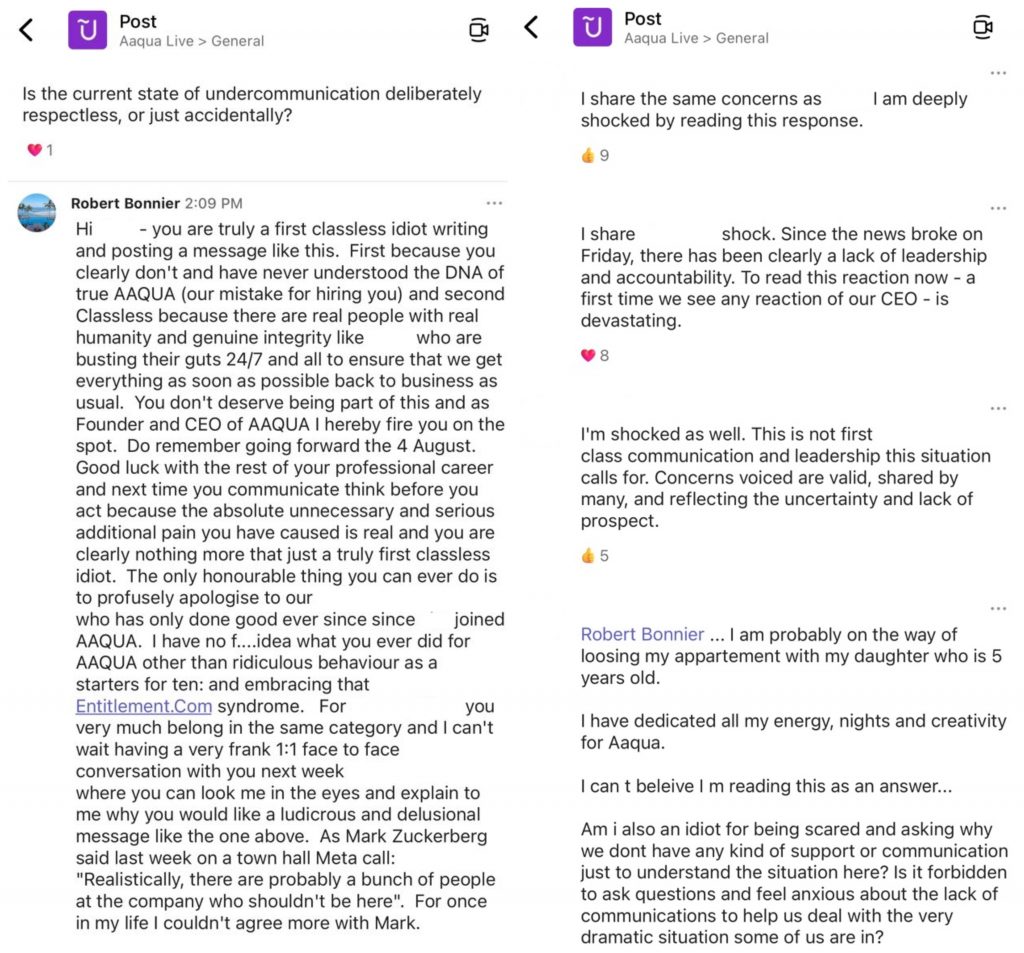
“It was quite an aggressive rebuttal,” Aaron recalls.
“But, I think it’s quite normal for him. Behind the scenes, we had lots of people getting fired. From rumours and whispers within the company, it sounded like people who are against Robert’s ideas or questioned his decisions were offed by him immediately after the act.”
According to AAQUA, in Bonnier’s 25 years of experience, he has fired three people in this manner and for “just cause”.
Bonnier fired one person 20 years ago related to sexual misconduct and another one about 12 years ago over the misappropriation of funds. The last person Bonnier fired was in Belgium, who displayed “abusive behaviour” to a senior executive who AAQUA says is “particularly vulnerable to that sort of utterly unacceptable behaviour.”
AAQUA continues to state that Bonnier has “a strong personality” who makes many short and long-term decisions daily. The company maintains it needed to stay focused on its “tangible deliverables” and that “there was a tendency for team members to overthink or find reasons and excuses to why the current requirements were not being dealt with.”
AAQUA also mentions senior executives were given “considerable freedom” due to their experience, and “it is normal that the person ultimately in charge should review and challenge in the event of things going awry.”
Blindsided by a Worldwide Freezing Order
On 29 July 2022, AAQUA’s HR director dropped an email on Bonnier’s behalf. The email stated that salaries were frozen due to a Worldwide Freezing Order (WFO) and that employees would not be paid for July.
A WFO is a type of prohibitory injunction ordered by a court, obtained by one party (the applicant) against another (the respondent) to restrain the respondent from unjustifiably disposing of, or otherwise dealing with, their own assets.
The WFO happened as a result of Bonnier being sued by one of his investors, Nick Candy. Candy alleged that Bonnier “made false representations about the prospects of his company, AAQUA BV, to get Candy Ventures to invest.”
Under a purchase agreement signed by the two companies, AAQUA paid £6.8 million to Candy Ventures and received an 18.12 percent share in Audioboom, the claim reads. In return, Candy Ventures would pay AAQUA €7.5 million (S$10.4 million) for 15,000 block shares.
Bonnier had claimed that Apple Inc. and LVMH Moët Hennessy Louis Vuitton were “founding partners” of AAQUA. According to the suit, these facts were critical to Candy Venture’s decision to invest. This would turn out to be a big lie.
Candy Ventures says the information it relied on to enter into this agreement was “false”, and at no time since its investment has the company been provided with any evidence that Apple or LVMH had planned to invest.
“To be honest, it caught most of us off guard,” says Aaron.
“We weren’t expecting such a big WFO. We knew that things were not going according to plan on Robert’s side because he was very quiet and had not appeared in months, but we weren’t expecting something this drastic.”
Olivia remembers receiving the email at 4 PM and being confused. Still, she was unaware of the gravity of the situation and took a more optimistic view, while colleagues in Belgium were thoroughly concerned.
“I thought the WFO would only last for about two weeks. That it will be lifted, and things will return to normal, but apparently not so.”
Updates were slated to come at the end of the week, but there was radio silence from the management at AAQUA.
Then, a date was set for another company-wide call. Most employees expected Bonnier to be present to give everyone an explanation of what had happened, but Bonnier did not turn up.
Instead, he was represented by a group of legal consultants for AAQUA, who delivered an update that didn’t say anything new or relevant. “They repeated what had happened and that they can’t reveal too much,” says Olivia.
“I don’t think they were entirely transparent about what was happening,” adds Martha, who was in the community development and building team for close to a year.
“There were a few articles about the lawsuit by then, but they didn’t tell us exactly what was happening. They kept saying, ‘Oh, we can’t tell you because of the ongoing case right now’.”
“Anxiety levels were very high, morale was low, and honest communication was non-existent,” recalls Jack.
As such, many of the employees of AAQUA pooled together to uncover what was going on. Through their combined efforts, they found out the public details of the lawsuit through articles from places like Law360.
According to a statement by AAQUA, they assert they could not communicate as much with employees as the nature of the WFO meant that “any action taken could be deemed in contravention with the original Court ruling.”
AAQUA states that the WFO and lawsuit were “an unprecedented nuclear situation and incredibly challenging to deal with.”
They maintain that they did their best to keep employees informed, where “very senior management [were] working day and night to ensure that the malicious litigation would be neutralised as soon as possible.”
AAQUA goes on to say, “if a plane is about to drop out of the sky because of total malfunction, the first priority of the pilots is to ensure a safe landing.”
“There was a very weird atmosphere in the company,” explains Aaron. “There was one group of people that were very anxious to get answers. Meanwhile, another group of people were nonchalant about it, deciding they could wait it out.”
By then, most employees had already stopped working, CVs were updated, and LinkedIn profiles changed to indicate ‘Open to Work’.
Wishin’, Hopin’, Thinkin’, Prayin’
August 2022 rolled around, and employees finally received an update. This time, it was Bonnier himself who sent out an official letter to talk about the situation. The letter elaborated further on the case behind the worldwide asset freeze, which, as employees would find out, included Bonnier’s personal assets.
The letter mentioned that Nick Candy, who filed the lawsuit, could sustain a WFO for another two weeks. And if Nick Candy wanted to extend this WFO, the High Court in London has ordered Candy to “personally satisfy a guarantee of up to £10m for the freeze to be imposed”. Candy was given a deadline to pay this £10m by 4PM (London time) on 22 August 2022.
“There was some information about how Nick Candy might miss this deadline, and we will have a chance to get our pay because of that,” says Olivia. For her, it was a small glimmer of hope that this WFO would just be a blip and would be business as usual very soon.
Unsurprisingly, not everyone was as optimistic as Olivia. Most threw their hands up and refused to work.
“No one was working—no one was going online even,” recalls Olivia. “There were minimal tasks done for the app. No one was attending meetings, and these were meetings that were scheduled way before Everything was cancelled.”
“I think the entire feeling was like, are we going anywhere after this?”
All anyone in the company could do is play the waiting game, hoping to hear updates and possibly receive their salaries.
“I don’t know if it’s an intentional thing or if it just happens, but Robert likes to say he’ll give updates on a Thursday or Friday,” observes Aaron. “Such that it’s close to the weekend, and it’s kind of hard to contact him.”
The Bankruptcy Nail on the Coffin
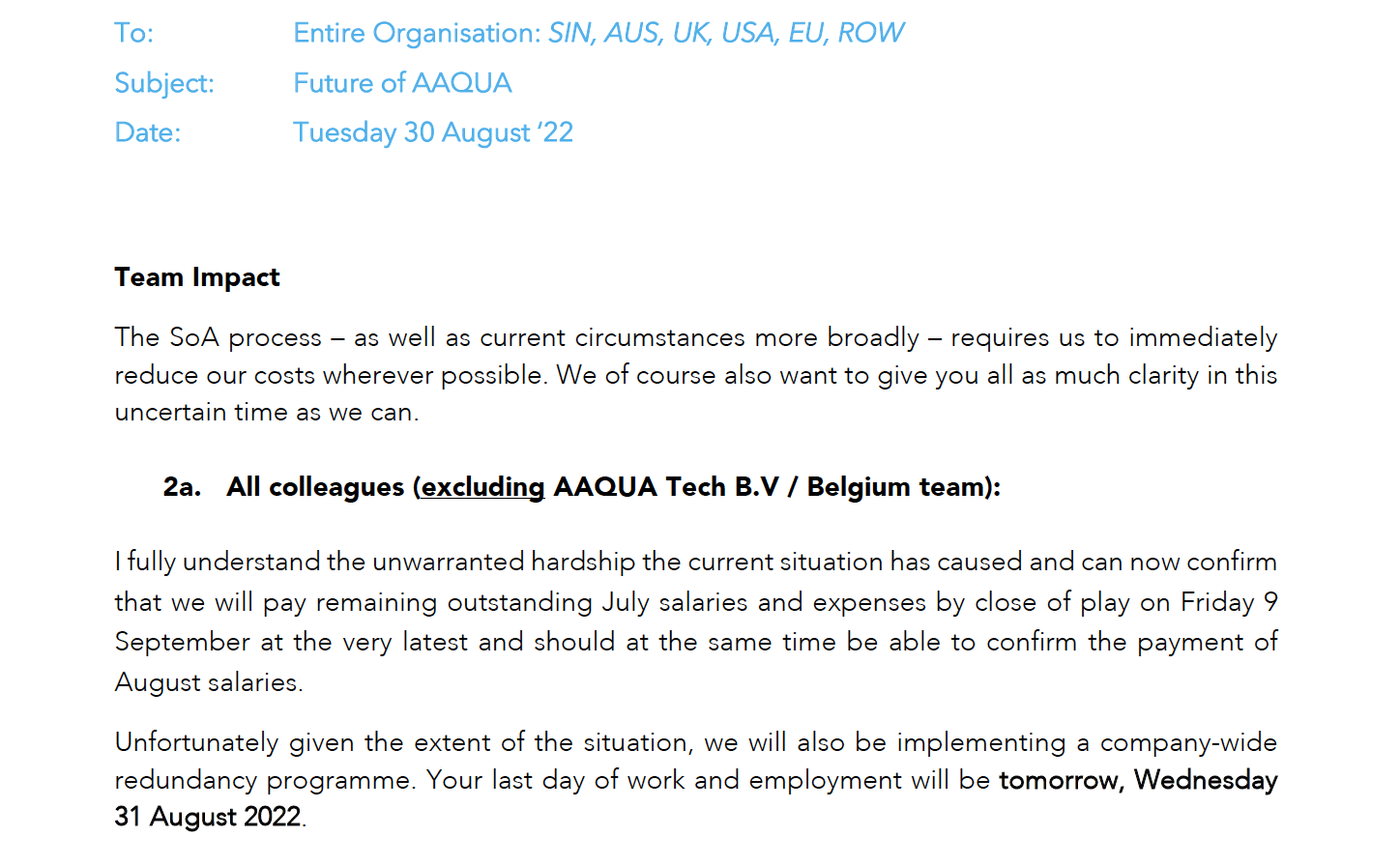
At 1:28 AM on 31 August 2022 Wednesday (9.28 PM, 30 August 2022, Tuesday, Belgium time), AAQUA sent out an email informing everyone that the company had filed for bankruptcy in Belgium. It also stated that everyone’s final day in the company would be the very same day.
Except for a skeleton team in Singapore and Belgium to tie loose ends, everyone else would be retrenched immediately.
“I somehow had a feeling it would happen—everybody kind of expected it,” says Olivia.

According to the email, there was supposed to be a “curtain closing” event on 2 September 2022 at 2 PM, where Bonnier would address the whole company. That meeting was subsequently cancelled, citing that a company-wide address was unnecessary since HR had called all the employees to inform them of their retrenchment.
“It does feel a little bit odd that we are all not speaking, and I’ve not seen the CEO’s face since this whole thing happened. Like he’s not showing up on a call to talk to us about it. Even though this is all his doing, you know?” questions Martha.
At the time, AAQUA employees had gone two months without drawing a salary. While some are fortunate to have backup plans, others feel the strain more keenly.
“It’s kind of hard,” says Aaron. “I mean, it’s two plus months without a salary. I’m not a fresh grad, but I still have uni loans and bills that depend on this salary.”
For Olivia, September saw her scrambling for freelance work and anything she could get her hands on.
“Two months without the income was a big impact.”
“I have a high running cost for the family. We have some savings squirrelled away to sustain for two months, but that’s about it. We are literally down to the last few dollars in the bank at this point,” says Olivia.
Olivia has three kids—two in secondary school and one in primary school. From school allowances, tuition fees, and everything in between, Olivia is grateful some relatives were kind enough to loan her some money to tide over until she starts her new job in October.
As of writing, the WFO has since been lifted, and AAQUA employees have been paid their July salaries on 21 September 2022 (even though they were promised it would be on 12 September).
At present, they are still owed their August salary, one month’s notice, and their encashed leave (~20 days). AAQUA gave no updates as to when they would receive all backdated monies owed to them.
AAQUA maintains that there have been many interactions with former team members, and they have a lean team handling these issues. According to AAQUA, their priority is to file the Singapore Scheme of Arrangement that would provide “even more protection to ex-team members”.
Allegedly, according to some employees RICE spoke to, Bonnier has signed some sort of agreement with the Singapore government to pay his employees in blocks.
AAQUA states this is untrue, and Bonnier is in regular contact with various government organisations in Singapore to ensure they follow protocol with former team members treated on a priority basis.
AAQUA also denounces that “certain ex-team members have made highly inappropriate and unprofessional comments particularly directed at Robert and his direct family, yet at the same time expect that they can demand whatever they want.”
AAQUA asserts Bonnier has never ever received a salary and was never reimbursed for the millions of expenses incurred for the benefit of the AAQUA group.
They claim that despite these difficulties, “Bonnier is unwavering in his determination that every ex-team member receives their full contractual benefits”.
‘We Were So Close‘
AAQUA had its growing pains, just like every budding startup, but no one truly saw its demise coming so quickly and so painfully.
“In the last few months, we were working quite hard to launch the app. I do remember working on quite a few documents, such as the list of requirements you need before launching and things like that. We worked right up until the assets were frozen,” says Martha.
“We had so many things in the pipeline,” continues Olivia, “we had entire passion community features lined up. Basic features include posting your passion community updates, polls, and even live-streaming events.”
Olivia remembers the anticipation and excitement that filled her team as these plans continued to roll out The team was happy with the design, and UI events were in the works. There was some light at the end of the tunnel, after all.
The WFO derailed all their hopes. And with the bankruptcy announcement, everything fell apart pretty quickly.
“It was a hope the app would materialise. Now, it feels like all this effort is wasted.”
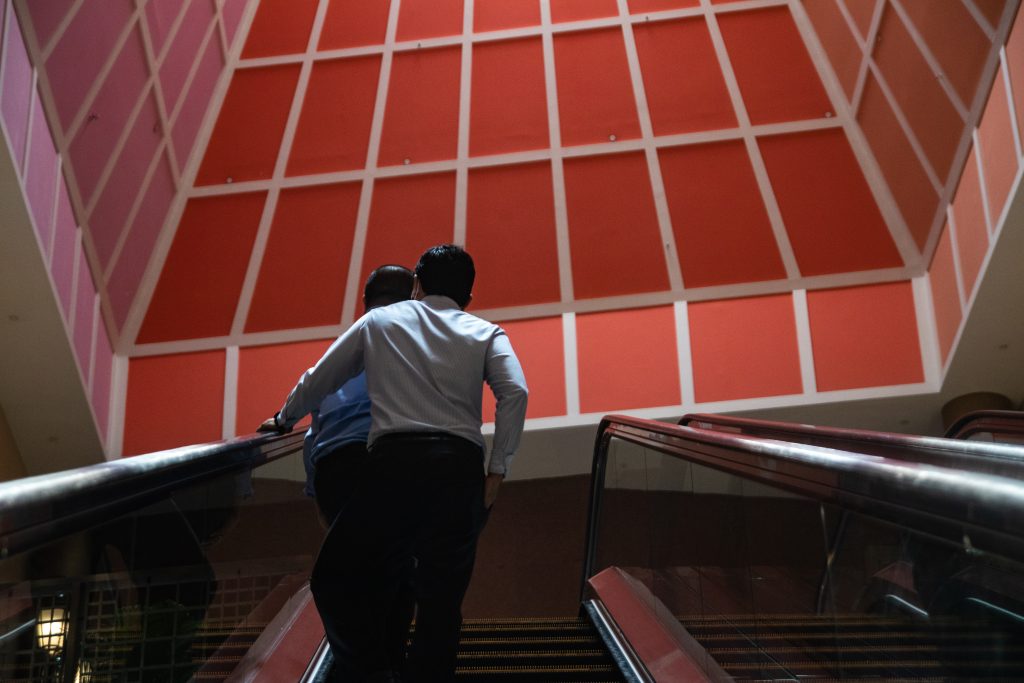
Closing the Chapter
After what seems like a never-ending nightmare, it appears that the dust is finally starting to settle with AAQUA. Even as its employees are still reeling from all that has transpired, they are ready and eager to put this behind them.
“Everyone is moving on. We have very little confidence that the app will go anywhere in the future,” says Aaron. “In a way, we are just waiting for these salary issues to resolve so we can close this chapter.”
Despite his time at AAQUA ending terribly, Aaron still considers it a good learning experience. The opportunities and the exposure AAQUA gave him could never be found anywhere else, he says.
Olivia has also made her peace with AAQUA, even as she quips about the mild PTSD she has towards any of her workplaces now.
“If the money comes, it comes. If it comes now, great It will relieve the financial stress of the last three months. If it comes three years later, I’ll treat it as a bonus,” Olivia says matter-of-factly.
“I don’t want this money to be holding me back or having this thought nagging and tugging at the back of my head. Nothing about this episode is going to deter me from moving forward.”

